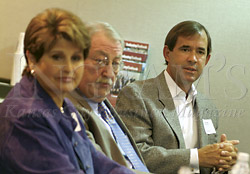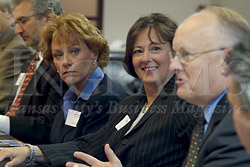
Dan Lowe of RED Development discusses his concerns associated with regulating the use of STAR Bonds. Joyce Murray and Larry Buck observe with interst.
In addition to “oil, war and terrorism,” Carl LaSala of LaSala-Sonnenberg cited one other external factor that could have a serious impact on the local real estate business, and that is technology. “Technology is changing so quickly,” LaSala said, “that we’re probably going to see sometime in our life-time real estate being sold on eBay.”
When it was suggested that LaSala check eBay to see if real estate wasn’t already for sale, he joked, “None of my properties are. I can tell you that.”
The point was made that local commerce always has felt threatened by external forces. A century ago, for instance, local merchants fretted about the impact of the mail order houses the way contemporary merchants do about the Internet.
“I think the biggest threat is Sprint,” cautioned Nunnink. He worried that given its recent merger with Nextel, the companies would consolidate their offices back east. He called it “the enormous risk component of our marketplace.” Field added, “I think it has always been the gorilla in our back yard.”
Greg Bates was not about to give up Sprint without a fight. “There is a quality of life here that you’re not going to get in New Jersey,” he offered, “and an affordability that you’re not going to get in Washington DC, or wherever they might move.”
Public Accommodations
One issue that is becoming more problematic was raised by Mike Fishman of Fishman and Co. realtors in Olathe. That is, “dealing with governments.” As Fishman observed, the process of getting approvals often slows the project or makes it too expensive to be feasible.

Kevin Nunnink of Integra Realty Resources discusses the effective use of STAR Bonds on the Village West project in western Wyandotte County. Lori Harp and Debora Field look on.
The problem is compounded because, as Dan Lowe noted, the larger tenants “have come to expect almost free deals” and thus are chasing public money as they never have before. This invariably involves more governmental scrutiny. Lowe was particularly concerned that the overzealous pursuit of STAR Bonds in Kansas would doom a program that already has proven its value. “I think no one ever dreamed what happened in Wyandotte County could happen,” added Nunnink in reference to the Village West project, which was financed by STAR Bonds.
As Lowe explained, the program intended to provide Kansas communities the opportunity to issue bonds to finance the development of major commercial entertainment and tourism areas and use sales tax revenue generated by the development to pay off the bonds.
Citing “some jealousy between some of the communities,” Nunnink explained that some Kansas legislators have been attempting to introduce bills that would limit, if not eliminate, the effectiveness of these bonds. The proposed legislation posed a particular problem for this group, Nunnink elaborated, as it would limit real estate brokerage fees and thus destroy any incentive to show a given property. “It goes beyond that though,” added Lowe. “They’re trying to limit soft costs almost totally.”
Nunnink and Lowe both defended the Unified Government’s performance at Village West as well as the integrity of the enterprises involved, like Cabela’s. “The goal of STAR Bonds was to create tourism in the state,” said Lowe, “and I think that they accomplished their goal certainly in Kansas City, Kansas.” The question was raised, though, as to whether the nature of the deal Cabela’s entered would not induce other enterprises to seek comparable deals and more public money.